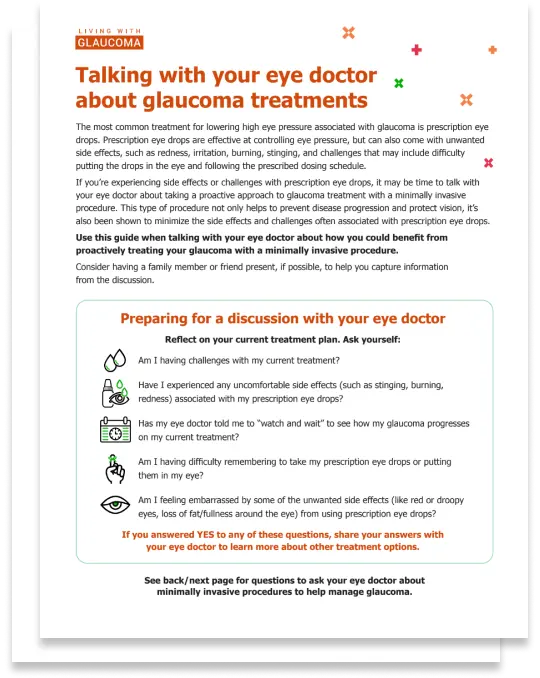
Talking with your doctor
If you have a diagnosis of glaucoma and are thinking about treatment, you have options. However, some glaucoma treatments might be better suited for you than others, based on your specific condition, needs, and lifestyle.
Determining the best glaucoma treatment option for you begins by being proactive and talking with your eye doctor, who can help you get a clear and specific understanding of your glaucoma treatment needs. Together, you’ll be able to come up with a plan to manage your condition.
Guidance for exploring other glaucoma treatments
If you’ve received a diagnosis of glaucoma, it may interest you to know that there are now minimally invasive procedures to help manage your eye pressure. Knowing if and when you should ask your eye doctor about switching from prescription eye drops to a different treatment, or which one is best suited for your needs and lifestyle, can be difficult—especially if it’s a treatment you’re not familiar with. This list of possible scenarios may help you consider if it might be time for a change in your treatment plan:
Do any of these sound like you?
My ophthalmologist has told me to “watch and wait” to see how my glaucoma progresses
My prescription eye drops are causing uncomfortable side effects (such as stinging, burning, redness)
Sometimes I forget to take/use my prescription eye drops
My prescription eye drops are making my eyes red or droopy and it can be embarrassing
It’s challenging to get eye drops in my eyes and sometimes they land on my face
I’m not aware of the alternatives to prescription drops for managing glaucoma
If you can relate to any of these scenarios, reach out to your eye doctor to find out if other glaucoma treatment options might be right for you.

Preparing for your appointment
Glaucoma can only be diagnosed during an eye exam, which is why it’s critical to be proactive and schedule regular checkups with your eye doctor. Leading up to your appointment, be sure to follow these steps to ensure you’re prepared for and able to make the most of your visit:
List any symptoms you’ve been having and include the length of time you have been experiencing each of them.
List any history you may have with eye problems, such as vision changes, other diagnosed eye conditions, and any eye discomfort. Write down any history of eye trauma and list any eye problems in your family, if known.
Write down your medical information, including other conditions such as diabetes or blood circulation issues you may have, and all medications and supplements you’re currently taking.
Write down any questions you may have for your eye doctor, so you remember them. This will also help you make the most of your appointment.

Interested in Interventional Glaucoma treatment options but don’t know where to start?
Be proactive—talk with your eye doctor. To ensure you’re prepared, check out this discussion guide.
View discussion guideHow to make an appointment with a glaucoma specialist
After you receive a glaucoma diagnosis, your eye doctor may recommend that you visit a specialist and refer you to a physician within their trusted network. However, if you are not able to obtain a referral or make an appointment, you may need to find a new doctor…Read more
Note: The information provided is for educational purposes only and does not constitute medical advice. All treatments have risk. Discuss the benefits and risks with your eye doctor to decide the best treatment for you.